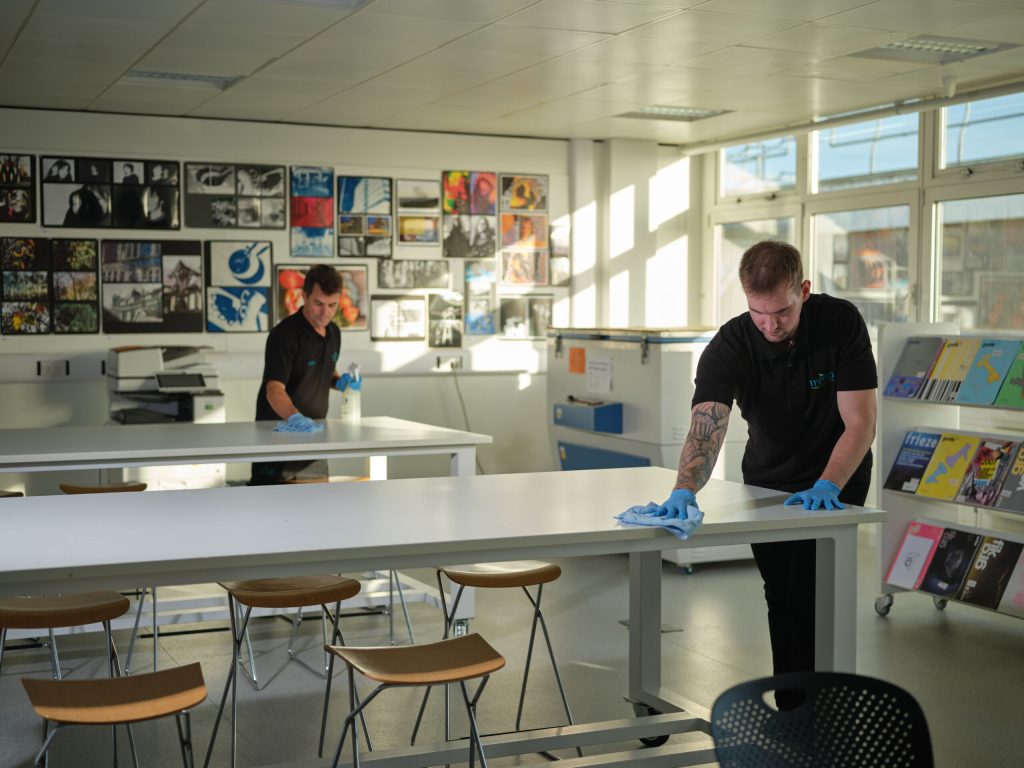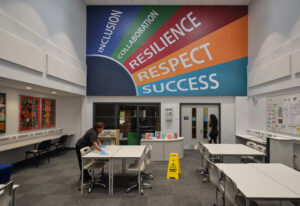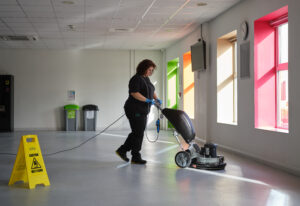If schools want cleaning done properly, should they do it themselves?
01 March 2023 Category: Nviro News Schools, Academies and Trusts
We’ve seen many schools left disappointed by their last cleaning provider. Often they were promised cheap delivery but they were left with poor standards and a mess to clear up. The question school business managers are often left with is, is it worth outsourcing at all? If you want cleaning done properly, and if you want tighter control of costs and standards, should you do it yourself?
If you are considering this, it’s really a decision you only want to make once. Schools have enough on their shoulders without having to worry about more ballooning costs, management issues or absences related to a drop in hygiene.
After a poor experience with a cleaning company, a number of schools have sought refuge in Nviro, noticing the difference in our values and ethos. We’ve seen others decide to bring everything in-house to avoid the chance of being disappointed again. This is a valid option but the path to running an in-house cleaning team is usually a little bumpier than they expect.
Let’s talk about why that might be the case.
They don’t teach cleaning operations at school
Cleaning is one small part of a larger operation. Bringing on a new team involves looking for the right people to onboard. You have to train them, figure out how to manage their workloads, and develop ways to keep them motivated while they work for you. It’s a significant HR project.
Cleaning roles often see high staff turnover levels, often at over 50%, particularly with the recent pressures on cost of living. As soon as your team members no longer work for you, the HR processes of hiring and training repeat as you orientate a new person to slot into the existing team. It’s a continuous process, and any break in that process means failing standards in the cleanliness of your organisation.
Learning the cleaning ropes is another education project
With an outsourced team, you get to know that specialists are on hand when you need them, that there is flexibility in what you can ask for, and that absences are never going to be a concern. A crucial added aspect to that is training.
Do you know what is and isn’t safe? We have often found that, when managing their own cleaning teams, schools simply order products from their online supermarket. While this is a reasonable approach to small scale domestic cleaning, such products might not work together to create the best results at scale – and they may even clash.
Where there’s risk of chemicals unexpectedly reacting, there can be concerns related to COSHH (Control of Substances Hazardous to Health Regulations). It’s dangerous for some chemicals to even be kept in the same cupboard. So if you do keep cleaning in-house, you’ll need to carry out a COSHH assessment to ensure you stick to best practice.
It’s another specialist team to manage
Which staff member will manage your new cleaning team and how will reporting take place? How will you manage this information and use it to make decisions related to budget? You will need to think about these issues up front so they don’t take up too much time later.
Another area to consider when measuring in-house cleaners against outsourcing is whether continuous management is going to be worth it.
When you opt for outsourcing your cleaning teams, it’s not a case of selecting one group of cleaners for another. You are outsourcing the need to schedule regular one-to-ones, and the need to manage and adjust workloads. Sick days, holidays, and any other absences become the company’s consideration; not yours. When you need specialist cleaners for an important event, your job isn’t to find the cleaners. It’s to focus on the event.
Managing cleaning teams properly takes time, effort and commitment from your leadership. And arguably, they should be focused on other challenges, like getting the most out of your teachers and providing the best learning outcomes for students.
Some schools think of hiring in-house as a way to foster more community and continuity across their teams. The cleaners are ones that they have chosen, that they are managing, that they are responsible for. The cleaners are ‘their team’. They’re part of the community. However, this isn’t a wholly accurate view.
It’s nice to think about the cleaners, janitors, administration, ground maintenance and teachers as part of one big community but the truth is that the cleaners operate outside of standard working hours. They’re hidden employees, and they’re usually at your building when you’re at home. At that time, for instance, there’s usually no health and safety or first aider on site, even though cleaners are still facing health and safety risks.
What will cleaning teams value more? A sense of connection to colleagues they seem to be isolated from? Or are there other ways to show cleaners they are valued?
For example, when our cleaners work in schools and our other educational sites, they find it engaging. That’s because we train them, we demonstrate where they add value, and we make them feel part of a specialist team of cleaners, as opposed to just the ‘clean up team’ who show up at the end of the day.
More than this, we also encourage our teams to think about the environment that they create and to get a sense of purpose through knowing the difference that makes: whether it’s reducing absences that impact learning, or providing a space where students and staff can feel safe and feel they belong.
Without specialists, it can be hard to keep up
Hygiene sat at the front of everyone’s minds during the Covid pandemic but that pandemic hasn’t ended. As global travel continues, and as the population increases, we’re going to need to be on top of things. That doesn’t mean national lockdown at the drop of a tissue but it does mean staying at the cutting edge of cleaning technology.
A cleaning company like Nviro, which has over 1,300 team members, is going to be able to keep up to industry standards – and will be trialling innovative and time saving new technology – in a way smaller teams can’t.
Insourcing cleaning is usually more expensive than you think
Running an in-house cleaning team has costs that go far beyond payroll. There’s training, pensions, and other overheads, such as products, plus the inefficiencies that are a natural part of forming a new, small team.
Outsourcing may seem a more expensive option at first glance but the right team will be able to better foresee problems, maintain high standards efficiently, and source the technology and products you need for a fraction of what a school could hope to pay for. So considering the costs it can cut, and the time it can free up, it’s worth looking beyond the surface level price tag.
If you prefer to keep cleaning in-house and want to make sure you’re providing everything your cleaners will need to be effective, feel free to talk to us – we can offer consultancy to help set you up for success.
As a specialist cleaner in educational settings, Nviro provides clean, hygienic and safe environments in universities, colleges and schools. Read our blog about ‘What happens if pupils are worried their school is unclean?’.


